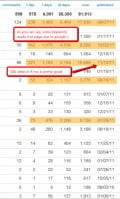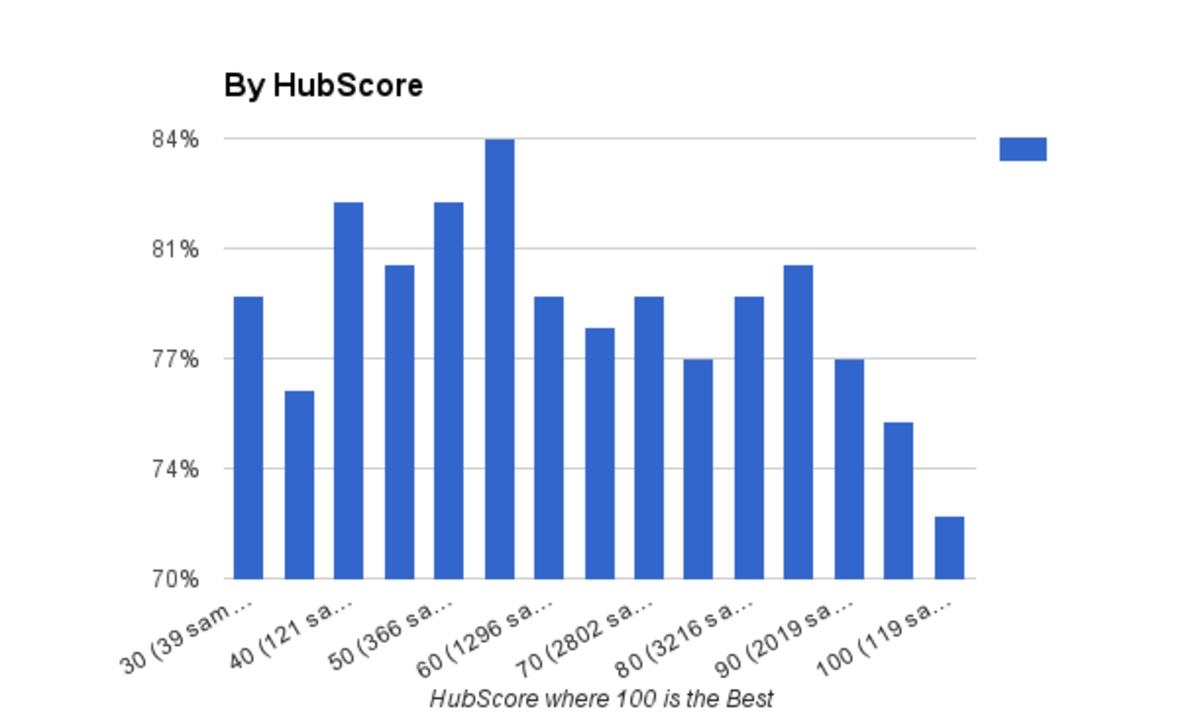- HubPages»
- Business and Employment»
- E-Commerce & How to Make Money Online»
- Search Engine Optimization
Keyword Competition Tool : Free Online Analysis of Long-Tail Keywords
Finally you can do all your keyword research and analysis checks ONLINE for FREE!
You can research keywords, generate long-tail options and test them all using a keyword competition analysis tool for FREE using online tools.
Finding keyword niches is the key to making money online by writing articles, blogs and building websites and pages for attracting buyers and generating income via Adsense and affiliates.
But you won't make money unless you can compete and you need to know this at the outset.
Up until now you can only do this effectively with expensive tools such as Market Samurai and Micro Niche Finder and other tools which are expensive are hard to use. Now (finally!!) there are free tools for doing all the steps including the competition analysis.

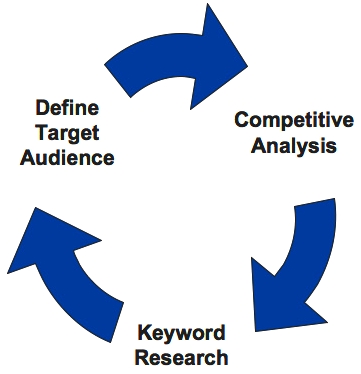


The free online methods are outlined fully in Title Tag SEO Best Practices and on the site: a1niches.com, which provides a list of competitive niche keyword choices for various topic. This is a good way to start as it gives you a list of competitive keywords for various topics.
Step 1. Use the Google Keyword Research Tool to get the basic information about keyword options.
The key bits of information are:
Global traffic per month, CPC - the amount advertizers will pay to advertise the word and the number of websites competing for the keyword phrase. The term 'competition' is not what you think - it is the number of advertisers competing for the phrase. This is still useful but it is not keyword competition analysis in the sense of a rating of how easily it will be to compete for that keyword.
The holy grail is keywords that have High CPC, High Competition for the Adword, High Traffic with a very low number of websites that use this keyword.. BUT this is not achievable - you will have to aim lower because you will be unable to compete at this level and the keyword will be already consumed by pages with Page Ranks of 5 or 6, brand names and high authority.
Lower your expectations and be a bit more realistic. Look for keywords that a range between 1,000 to 30,000 global searches per month with CPC around $1.00 and moderate to high Adword competition.
The Google Keyword Tool is also a good way to help you with keyword suggestions. For example you can enter the word ‘How to’ into the search box and get a list of suggestions to try. Enter your preferred topic for you to choose from.
Choose several options from your Google Keyword Research Tool.
Step 2. Use the Google Autosuggestion tool to look at various long tail keyword options. You can use the Google search box itself or use one of three free online tools.
- Autocomplete Test - has a built in way of doing "intitle", "inurl"and similar searches.
- UberSuggest- Provides a list of 10 Google Autosuggestion words which can be expanded. You can copy the keywords directly from the page.
- Suggester - provides a huge list of keyword suggestion using Autosuggestion.
The advantage of Google Suggestions is that the suggestions are presented in order of what people have searched for previously. The phrases are therefore good and well used, tried and tested options, rather than unused phrases. They are also popular phrases and are a great way to build long tail phrases. Strangely this lengthening of the phrase is necessary, to narrow the search field to get into an area where you can compete.
© janderson99-HubPages
Autosuggest
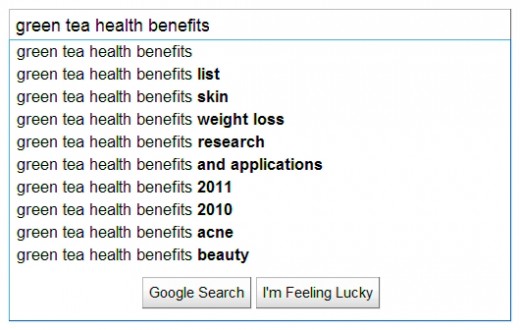
Step 3. Test the competition for your Keyword Choices
The good news is that you can now do this online for FREE using various online tools.
You can enter up to 10 keyword phrases (which you can copy directly from UberSuggest) and it will do a full competition analysis for you. The details are shown below.
It utilises algorithm that is designed to take into various bits of information from the top 10 sites for the entered keywords ( out of 100 - the lower the score the less competition). Tool provides a good estimate of how hard it will be to compete for the keyword and summaries the relevant data. The tool considers:
- Pagerank
- Page Authority
- Domain Authority
- Domain Age
- Listed in Dmoz
- Listed in Yahoo
- Keyword phrase in the Root Domain
- Keyword phrase in the Title
- Keyword phrase in the Description
- Keyword phrase in the H1 Tag
Three example of the outputs are shown in the figures
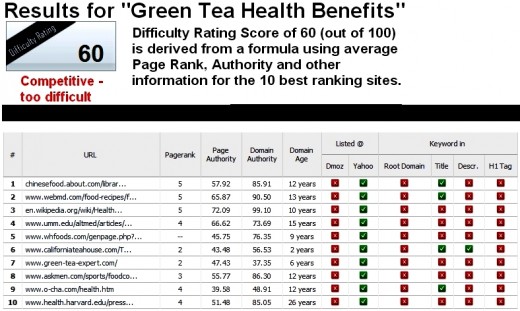
Example 1. "Green Tea Health Benefits"
It would be very hard to challenge the existing competition for this phrase.
The Competition is 60 - aim for score around 40 or below.
- There are three pages with PR of 4 and another three with a PR of 5
- Several pages have the keywords in the title, and the pages are relatively old and well established with high authority
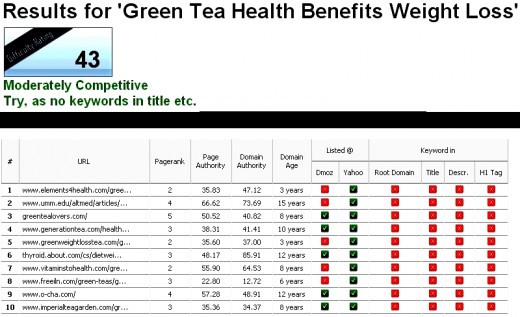
Example 2. "Green Tea Health Benefits Weight Loss"
This phrase was included in the Google Suggestions
It would be moderately hard to compete for this phrase.
The Competition is 43.
- There is one page with PR of 5 and two pages with a PR of 4
- But no pages have the keywords in the title,
- Competing pages have moderate age and authority.
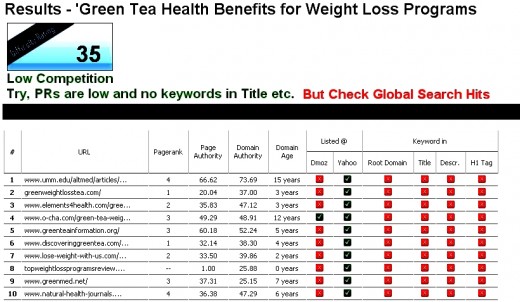
Example 3. "Green Tea Health Benefits for Weight Loss Programs"
t would be relatively easy to compete for this phrase.
The Competition is 35. (LOW)
- There are two pages with a PR of 4
- But no pages have the keywords in the title,
- Pages have low age and authority.
Final Step:
Enter your phrase into Google and look at the sites that appear on the first page of the search results. Open some of them to see their PR using a browser add on. Look at how many ads are displayed on the pages - a healthy number indictes that advertisers will be likely to appear on your page. Look at the way the long-tail keyword phrase appears in the search result summaries. When you build the page or finalised the article or blog make sure that the excact phrase appears in the Title, Description and URL(for artocles and blogs). This will give your page a boost in helping your page appear on page one of the search results.
If your review shows a poor outcome for the chosen keyword then you will have to go back several steps and try another option. It's a lot of work, but itwill pay off in the long run.
Conclusion:
Now you can conduct keyword research and analysis for FREE ONLINE!
© 2011 Dr. John Anderson


